10 Best Free Digital Marketing Tools for College Students
Digital marketing has become more complex and dynamic than ever before and a lot of companies rely on digital marketing. As college students, having digital marketing skills make them more marketable. To succeed in this highly competitive environment, businesses need to use the best marketing tools available. Today, we will explore some of the top marketing tools that can help you improve your marketing campaigns, and weigh their pros and cons.
What is digital marketing?
So, what is digital marketing anyway? The technique of advertising items or services using digital channels such as search engines, websites, social media, email, mobile applications, and other digital platforms is known as digital marketing. Digital marketing’s purpose is to engage with target audiences, raise brand recognition, and eventually increase traffic, leads, and sales.
Search engine optimization (SEO), pay-per-click (PPC) advertising, content marketing, social media marketing, email marketing, and mobile marketing are all examples of digital marketing methods. For engaging consumers and generating conversions, each strategy has its own set of tools, tactics, and strategies.
Digital marketing has several benefits, one of which is the opportunity to track and evaluate results in real-time. Businesses may monitor website traffic, engagement levels, conversion rates, and other data with the use of analytics tools to have a better understanding of how their marketing initiatives are doing. Then, by using this data, campaigns can be optimized, customer experiences can be enhanced, and better outcomes can be generated.
10 Best Free Digital Marketing Tools
1. Google Analytics
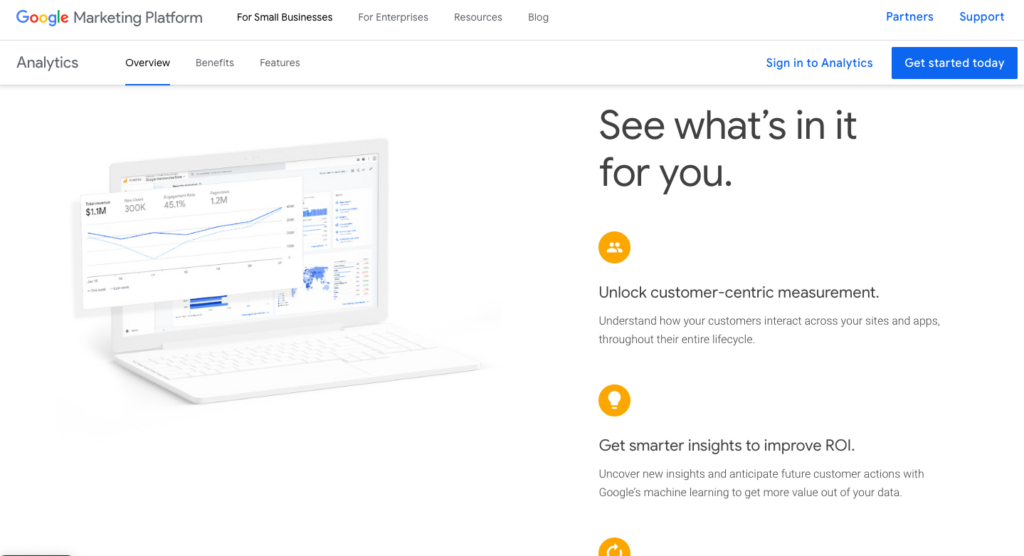
Google Analytics is a free online analytics service that offers data and crucial analytical tools for marketing and search engine optimization (SEO). Businesses that want to examine website traffic and user behavior should use this tool. because it is simple to set up and use and offers a lot of data on the performance of your website. If you have a website for your business or blogging, you should definitely use this!
Pros:
- Provides detailed reports on website traffic, including the number of visitors, bounce rate, and session duration.
- Helps to understand customer behavior, such as the pages they visit, the time they spend on each page, and the sources of traffic.
- Provides insights into website performance, such as load times and page speed.
- Offers advanced reporting and segmentation options.
Cons:
- Google Analytics requires some technical knowledge to set up and configure.
- It can be overwhelming for beginners, with a steep learning curve.
- Can be affected by ad blockers or privacy extensions, leading to incomplete data.
2. Mailchimp
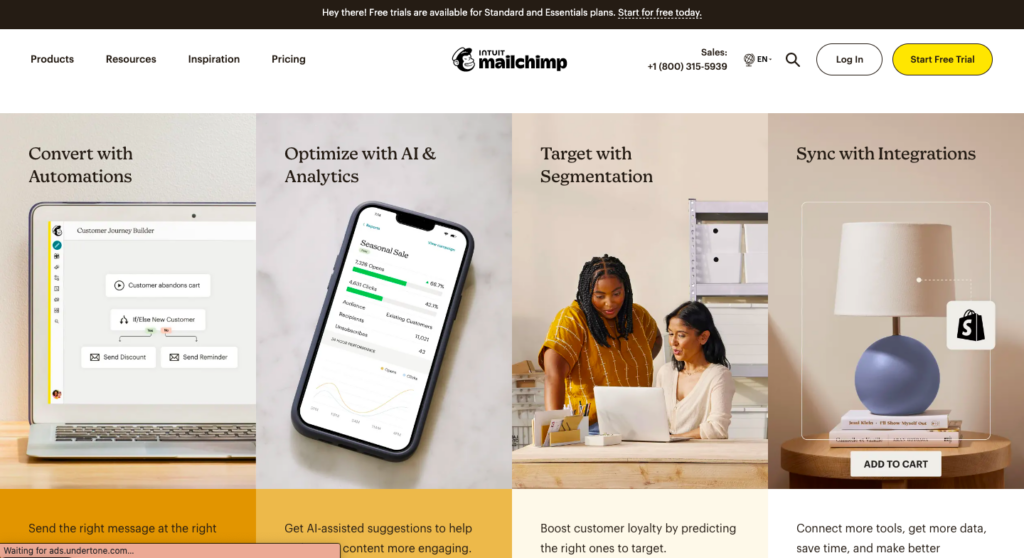
Mailchimp is an email marketing tool that allows your business to create and send email campaigns. It is user-friendly and has a range of features that can help you grow your email list and engage with their subscribers. We hight recommend it!
Pros:
- Offers a wide range of templates for email campaigns, making it easy to create professional-looking emails.
- Provides detailed reports on email campaigns, including open rates, click-through rates, and unsubscribes.
- Offers A/B testing options for subject lines and email content.
- Integrates with other marketing tools, such as Facebook and Instagram.
Cons
- The free plan only allows up to 2,000 subscribers and has limited features.
- It can be overwhelming for beginners, with a steep learning curve.
- Pricing plans can get expensive as the number of subscribers grows.
3. Hootsuite
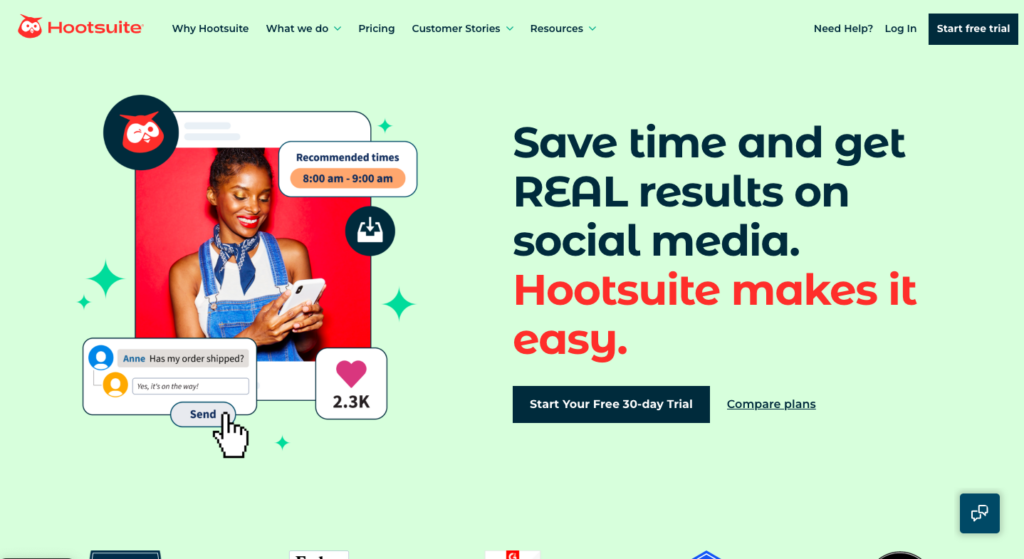
Hootsuite is a social media management tool that allows you to manage multiple social media accounts in one place. Its features can help your social media to schedule posts, monitor social media conversations, and track social media metrics. It is very useful!
Pros
- It allows businesses to manage multiple social media accounts in one place, making it easy to stay organized.
- Provides scheduling options for social media posts, allowing businesses to post at the best times for their audience.
- Provides detailed reports on social media performance, including engagement rates and follower growth.
- Integrates with other marketing tools, such as Mailchimp and Google Analytics.
Cons
- The free plan only allows for up to three social media accounts and has limited features.
- It can be overwhelming for beginners, with a steep learning curve.
- Pricing plans can get expensive as the number of social media accounts grows.
4. Buffer
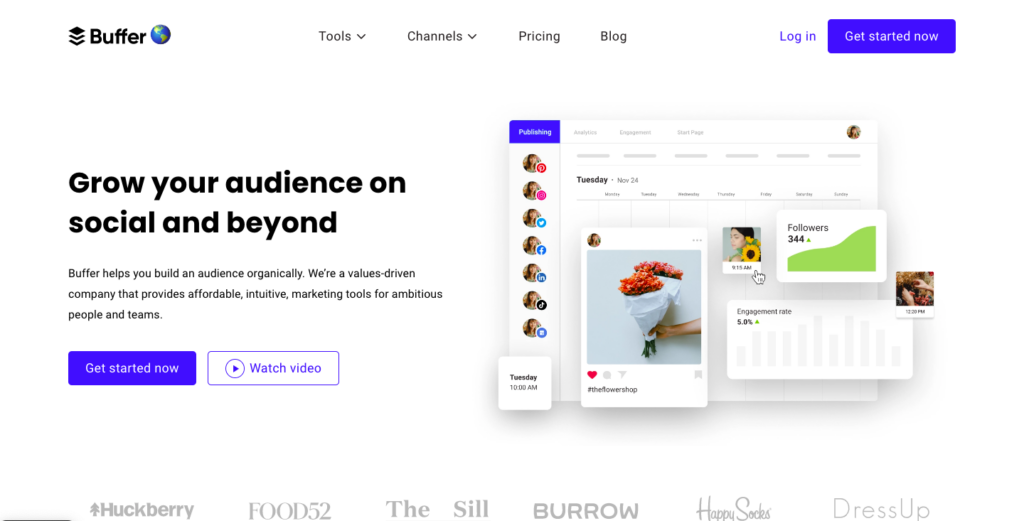
Buffer is a social media management tool that allows you to schedule and publish social media posts across multiple platforms. It is similar to Hootsuite but can help you manage social media content, track performance, and collaborate with team members.
Pros
- Provides scheduling options for social media posts, allowing businesses to post at the best times for their audience.
- Provides detailed reports on social media performance, including engagement rates and follower growth.
- Offers a user-friendly interface and a simple workflow.
- Integrates with other marketing tools, such as Mailchimp and Google Analytics.
Cons
- The free plan only allows for up to three social media accounts and has limited features.
- It can be overwhelming for beginners, with a steep learning curve.
- Some users have reported issues with delayed posting or posts failing to publish.
5. Hubspot CRM
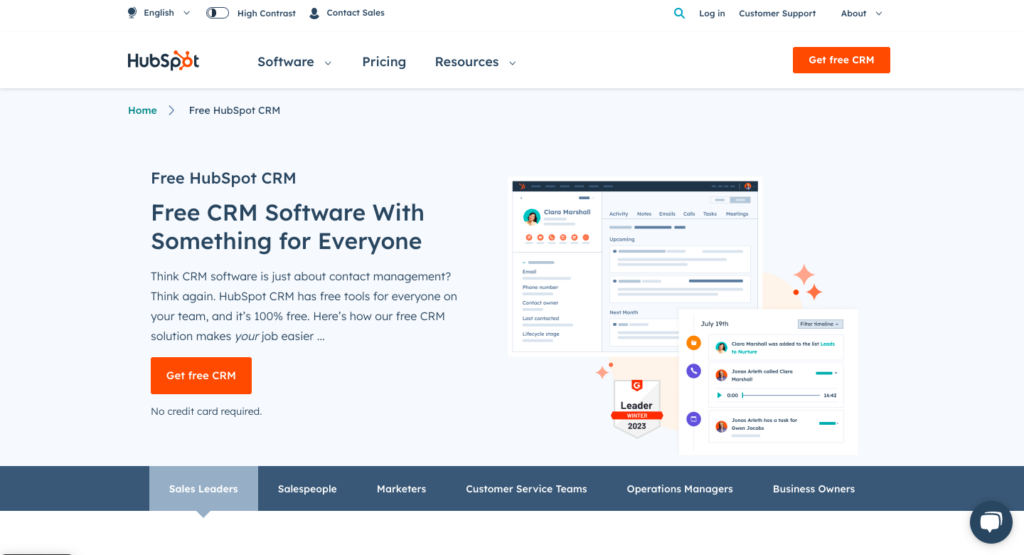
Hubspot CRM is a customer relationship management platform for organizations that helps them to manage client interactions and leads. This tool can assist businesses in tracking sales operations, managing client data, and automating procedures. Basically, you have your clients’ information in one place!
Pros
- Offers a user-friendly interface and a simple workflow.
- Provides various tools for managing customer data, such as contact details, interactions, and deals.
- Integrates with other marketing tools, such as Mailchimp and Google Analytics.
- Offers automation options for tasks such as lead nurturing and follow-up emails.
Cons
- Some users have reported issues with data syncing between Hubspot and other tools.
- The free plan has limited features and may need to be sufficient for businesses with complex sales processes.
- Pricing plans can get expensive as the number of contacts grows.
6. Yoast SEO
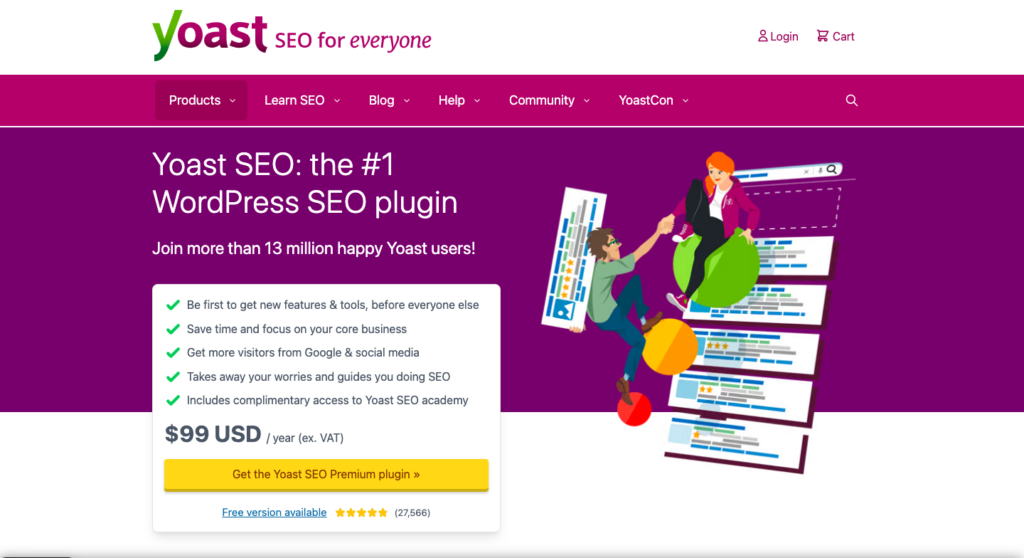
Yoast SEO is a plugin for WordPress that helps businesses optimize their website for search engines. It can help you to improve your website’s search engine rankings, such as content analysis, meta descriptions, and sitemaps. If you use a WordPress website, you should definitely check this out!
Pros
- It offers a range of features for optimizing website content, such as keyword analysis, readability analysis, and meta descriptions.
- It provides a user-friendly interface and easy-to-follow recommendations.
- It helps businesses improve their website’s search engine rankings and attract more organic traffic.
Cons
- It only works with WordPress websites.
- The free version has limited features and may not be sufficient for businesses with complex SEO needs.
- Some users have reported issues with conflicting plugins or themes affecting Yoast’s functionality.
7. SEMrush
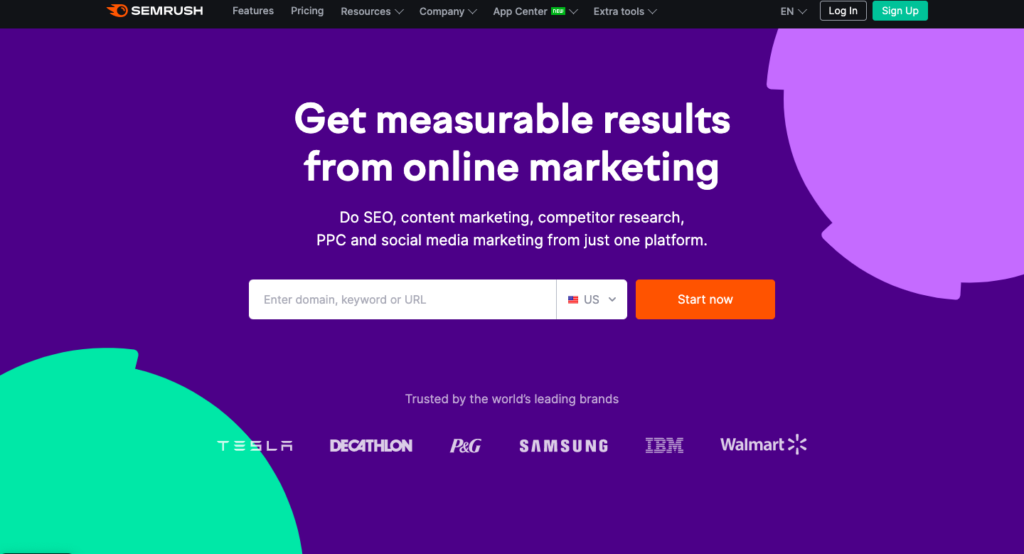
SEMrush is a marketing tool that delivers statistics on rivals’ advertising methods, search engine rankings, and website traffic to businesses. This tool can assist your business in identifying new prospects, tracking keyword rankings, and analyzing website performance. You can have everything you need for your website!
Pros
- Provides a range of tools for analyzing website performance, such as competitor research, keyword tracking, and backlink analysis.
- Offers a user-friendly interface and easy-to-understand reports.
- Helps businesses identify new opportunities and improve their marketing campaigns.
Cons
- Pricing plans can get expensive, especially for businesses with larger marketing budgets.
- The sheer amount of data can be overwhelming for beginners.
- Some users have reported issues with data accuracy or inconsistencies.
8. SurveyMonkey
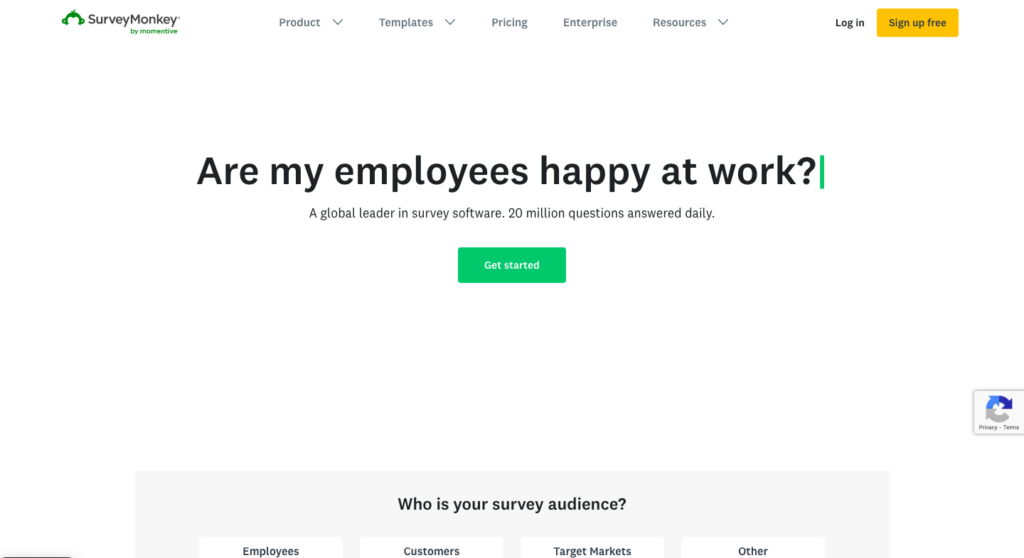
SurveyMonkey is a survey platform that allows organizations to generate and distribute questionnaires to consumers and workers. This can help you gather feedback, measure satisfaction, and improve client experiences. If you want to know your customers’ opinions, this is the right tool for you!
Pros
- It offers a user-friendly interface and a range of survey templates.
- Provides detailed analytics and reports on survey responses.
- It helps businesses gather feedback and improve customer experiences.
Cons
- The free plan has limited features and may need to be sufficient for businesses with complex survey needs.
- Some users have reported issues with the survey design or formatting.
- The tool may not be as comprehensive as other marketing tools, such as Hubspot CRM or Google Analytics.
9. Canva
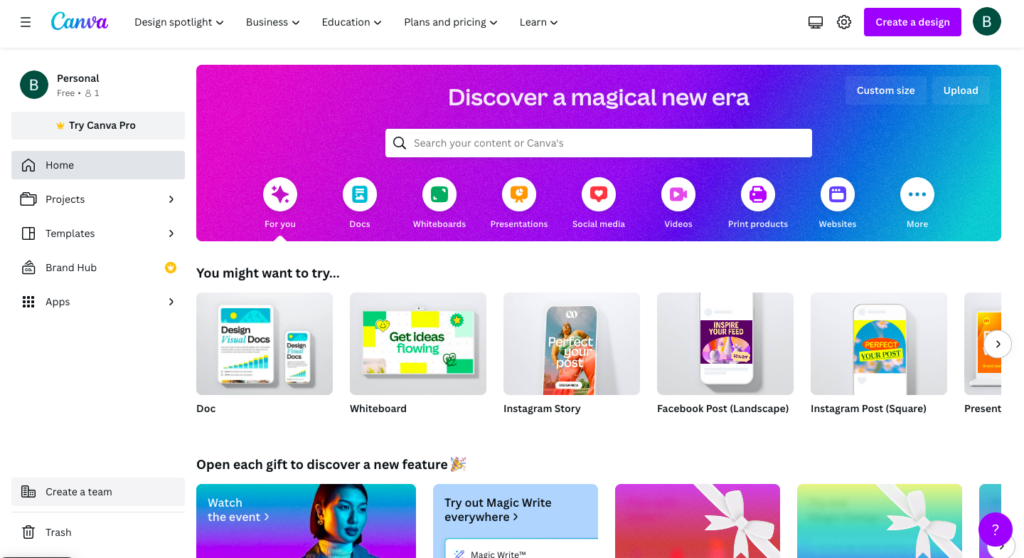
Canva is another excellent free learning tool for college students. While primarily a graphic design tool, you can produce visual materials for academic assignments, such as posters, presentations, and infographics. Here are some benefits and drawbacks of utilizing Canva as a free learning tool.
Pros
- Easy to use interface: Canva has a user-friendly interface that allows users to create professional-looking designs quickly and easily.
- Free templates: Canva offers a variety of free templates for users to choose from, making it easy to create visually appealing designs without having to start from scratch.
- Wide range of design options: Canva has a vast library of design elements, including graphics, fonts, and images, that users can use to customize their designs.
- Collaboration: Canva allows multiple users to collaborate on the same design, which is useful for group projects.
- Mobile app: Canva also has a mobile app, which makes it easy for students to create and edit designs on the go.
Cons
- Limited customization: While Canva offers a wide range of design options, there may be limitations in terms of customization compared to professional design software.
- Cost: While the basic version of Canva is free, there are some advanced features and design elements that require a paid subscription.
- Copyright issues: Canva offers a library of stock images and graphics that can be used in designs, but it is important to ensure that these elements are licensed for commercial use or free to use for academic purposes.
10. Shopify
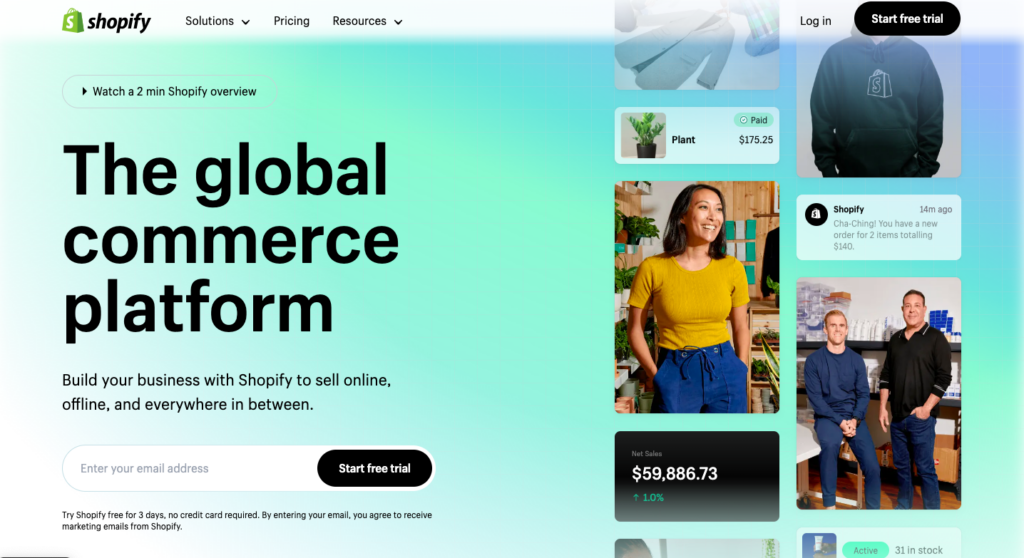
Shopify is an amazing e-commerce platform that can teach college students entrepreneurship, marketing, and business management. Here are some advantages and disadvantages of using Shopify!
Pros
- User-friendly interface: Shopify is easy to use, even for those with little to no experience in web design or e-commerce.
- Customizable templates: Shopify offers a variety of customizable templates that can be used to create a professional-looking online store.
- Marketing and analytics tools: Shopify includes built-in marketing and analytics tools that can be used to optimize sales and track customer behavior.
- Integration with third-party apps: Shopify can be integrated with a wide range of third-party apps, such as social media platforms and email marketing services, to streamline business operations and increase visibility.
- Support and resources: Shopify offers a range of support and educational resources, such as webinars and forums, to help users learn how to use the platform effectively.
Cons
- Cost: While there is a free trial period, Shopify ultimately requires a monthly subscription fee that may be cost-prohibitive for some college students.
- Technical knowledge required: While Shopify is designed to be user-friendly, there may be a learning curve for those with little to no experience in web design or e-commerce.
- Limited customization: While Shopify offers a variety of customizable templates, there may be limitations in terms of customization compared to a fully custom-built e-commerce website.
Summary
College students can access many free learning tools to help them succeed academically. From online courses to digital libraries, these resources offer a variety of ways to supplement classroom learning and explore topics in greater depth. However, it is essential to use these resources ethically and responsibly and always to prioritize legitimate academic sources whenever possible.
By using these free learning tools, college students can gain a deeper understanding of their fields of study, expand their knowledge and skills, and ultimately achieve their academic and career goals. Whether through online courses, open textbooks, or digital libraries, plenty of resources are available to help students thrive academically.
